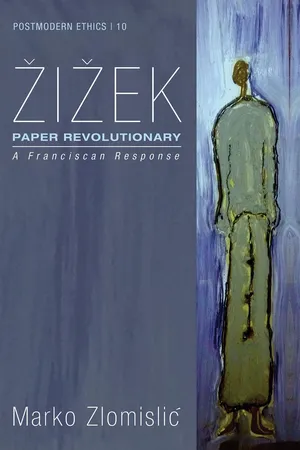![]()
1
Žižek’s Monstrous Politics
Slavoj Žižek’s leading question is how we are to reformulate a leftist anti-capitalist project in an era of global capitalism. In attempting to answer this question, Žižek often uses Kierkegaard’s insights to add weight to his analysis of the problems associated with our social and political reality. Yet when one reads Žižek’s work on Kierkegaard, one is struck by the great number of inconsistencies and errors that are generated. Žižek considers Kierkegaard from the point of view of the political in such a way that he avoids and negates the religious, but Kierkegaard is clear that if a proper politics is to exist, it must be grounded in real religious selfhood.
The single individual, as Kierkegaard makes clear in Two Ages, is “an essentially human person in the religious sense.” Kierkegaard’s views are directed by a religious notion of selfhood. Politics without this source is a form of despair. By failing to see ourselves as religious beings, we are in despair. This despair cannot be the basis from which to transform the coordinates of our current position. These coordinates, according to Žižek, reduce us to consumers and clients who are caught in the narrow circle of the commodity and the neo-liberalism of dehumanized globalization.
Žižek does not accept “liberal democratic capitalism as the final formulation of the best possible society.” While the spirit of his critique is correct, the reality of his solution is monstrous and filled with terror. One can criticize capitalism and the many problems it has created without leaping into the loving arms of Lenin, Stalin, or Mao, as Žižek does. I think that Kierkegaard’s philosophy provides us with a better alternative—a radical opening from which to re-think political theology from the position of the single individual to come. The program that Žižek upholds is not adequate for the transformation of society or self because it does not have a religious understanding of the individual. As such, Žižek’s position is grounded in despair, not love.
I want to show that the best evidence for despair is found in Žižek’s writings. My Kierkegaardian concern is that Žižek’s analysis remains at the aesthetic level of immediacy and impulse while not progressing to the stage of real existential faith, what Kierkegaard calls Religiousness B, where authentic repetition is located. In Kierkegaard words, “Repetition begins in faith. [ . . . ] repetition breaks forth by virtue of the religious.” To be clear, I am not critical of Žižek because he does not share the same sort of Christian faith that Kierkegaard has. I am pointing out that Žižek has no real sense of what Kierkegaard is trying to say. In short, Žižek makes a travesty out of Kierkegaard.
The Inhuman Crowd
When we usually think of repetition, we think of the mechanical in which the same thing happens perpetually. This repetition is boring and cannot give birth to an event. For Kierkegaard, repetition involves a reconciliation of the old and the new at the same time. It does not mean as Žižek claims, that the past can be erased so that we can start from “a zero point.”
Kierkegaard contrasts his notion of repetition with Plato’s metaphysics of recollection and Hegel’s metaphysics of mediation, showing how his concept of repetition takes us beyond Plato’s recollection to a new future. He demonstrates how the Danish word Gentagelse contains religious, ethical, and metaphysical meaning. In Danish, repetition means “to bring out” or “to fetch,” for Gjen means “again,” tag means “day,” and else means “getting,” so the word means re-getting it again in a new way each day. Plato argued that recollection involves climbing up out of the cave and recovering the past truth that the soul knew before it fell. Platonic recollection recovers only what has been lost. As such, there is no real future within recollection. For Kierkegaard, repetition is a forward recollection that renews all things. It brings a future that is unexpected.
Kierkegaard argues against Hegel’s mediation because it negates the past. Kierkegaard shows how Hegelian mediation does not have a true living past. Hegel’s mediation remains quantitative and mechanical rather qualitative and truly transformative. Kierkegaard shows us how a reconciliation of the past can allow for a new future. By arguing against the Platonic and Hegelian positions, Kierkegaard shows that neither can account for the truly new. Metaphysical necessity lacks the newness of the event that arises out of contingency and possibility. Kierkegaard shows if there is to be a truly free decision, it has to be based on a qualitative leap rather than a quantitative buildup of antecedents, such as the acorn becoming an oak tree. Kierkegaard’s model of repetition ultimately is based on the incarnation and the notion of personhood that Žižek’s Hegelian-Lacanian model lacks.
Žižek is fond of a portion of St. Paul’s second letter to the Corinthians: “From now on, therefore we regard no one from a human point of view . . . if anyone is in Christ there is a new creation, everything old has passed away, see everything has become new.”
Whereas Kierkegaard reads repetition as the new, Žižek interprets repetition as “the gesture of sublimation,...
